Bitcoin Poker Sites

The following is the simplest guide I can write about bitcoin, and I've been writing about bitcoin for a while. It’s the guide I would have wanted to read when I was first getting started playing poker with bitcoin.
Bitcoin (and cryptocurrency in general) appears complex at first, but in reality it’s easy to use, and playing poker with it is freedom. Sure, there are plenty of new technical terms floating around, but actually sending and receiving bitcoin is no harder than copying, pasting, and clicking buttons.
So here’s my bitcoin poker guide for beginners. You’ll be a pro less of an amateur by the end of it.
Where's best to play online poker using bitcoin?
You have two options:
1. Dedicated bitcoin poker sites. (Recommended)
| Room | Review | Rating | Traffic | Competition | Visit |
|---|---|---|---|---|---|
| SwC Poker | A | Low | Weak | Visit |
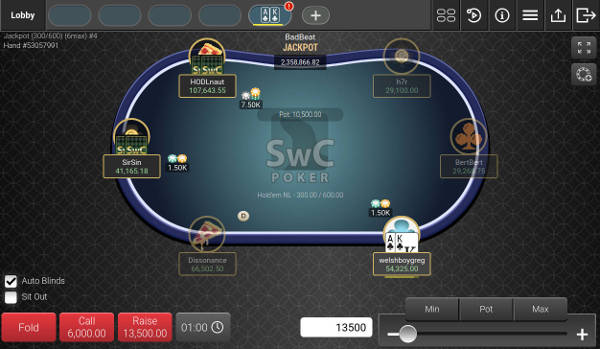
Theses are the true bitcoin poker rooms. Everything is done in bitcoin; you deposit with bitcoin, you play with bitcoins, and you withdraw your winnings back to your bitcoin address when you’re done.
These sites are relatively new to the world of online poker, so they’re like the indie-alternative to traditional online poker rooms.
However, they operate more efficiently than old-school online poker rooms due to the lack of regulatory rules slowing them down, and therefore are also able to provide the option to play online poker anonymously. I believe these sites are the future of online poker.
If you’ve got bitcoin, this is my recommended way to play online poker with it.
2. Sites using bitcoin as a deposit/withdrawal method.
| Room | Review | Rating | Traffic | Competition | Visit |
|---|---|---|---|---|---|
| Ignition Poker | A+ | High | Weak | Visit | |
| Americas Cardroom | A | High | Tricky | Visit |
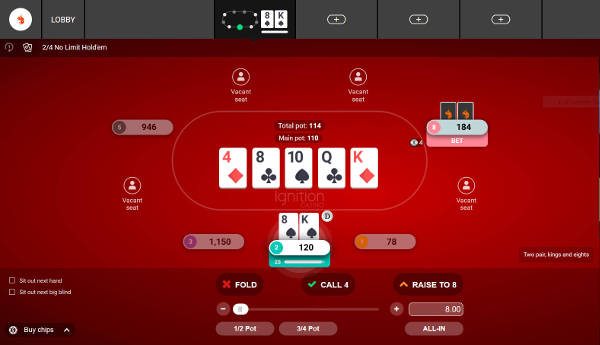
These are pre-existing online poker rooms that have added bitcoin as a deposit and withdrawal method. The bitcoins you send to these rooms are converted to dollars for you to play with, and are then converted back when you withdraw.
These rooms are not in the full spirit of bitcoin – they just use it as a method for getting money in and out of the room.
Nonetheless, because these are more established rooms they tend to have more players (so you can play at a wider variety of stakes), and the software tends to be a bit more polished. They also have a longer running track record, so they have proof of longevity.
So it’s basically a trade-off between indie and traditional online poker. Either choice is fine.
Why use bitcoin?
Good question. What’s all the fuss about?
Well, bitcoin gives you the freedom to move money wherever you want. It doesn’t matter if it’s $1 or $1,000,000 worth of bitcoin, it will get sent in the same way each time. It’s basically like email for money.
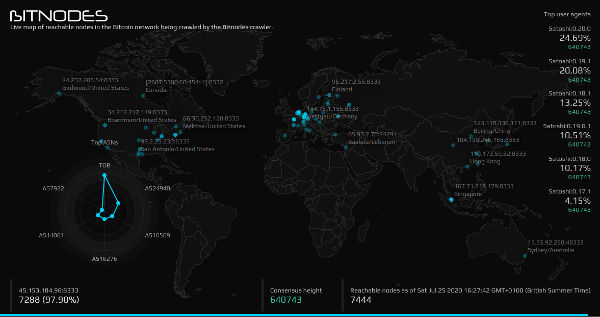
If you’ve ever made a bank transfer or used a credit card online you will know the hassle. You enter all your personal details in to a third-party payment provider, wait for that “payment successful” message, then close your eyes and carry on hoping nothing else goes wrong.
Using bitcoin is different.
With bitcoin, you just copy and paste an “address”, click send, wait 10 minutes (for the transaction to become irreversible), and you’re done. There is no bank or company checking that the transaction abides by their rules. You are free to send your money wherever you wish.

I could write legions of words explaining why bitcoin is cool, but the only way to understand is to actually use it for yourself…
How do I get started using bitcoin?
Alright, I’ll give you the basics you need to get going. I’m not going to hold your hand, I’m just going to show you how it works.
1. Download a bitcoin wallet.
A bitcoin wallet is a lightweight and secure program that gives you unique addresses that you can use to send and receive bitcoin.
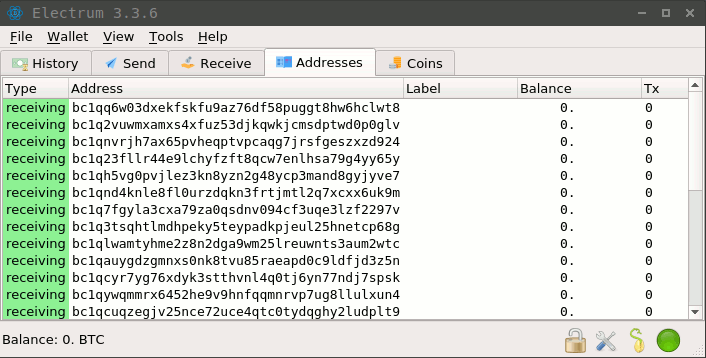
When you set up the wallet it will give you a seed, which is like a randomly generated master password that is used as the source for all the addresses in your wallet. Write this down on paper and keep it somewhere safe. If your computer crashes, you can recover all of your bitcoins immediately using this seed.

Do not screenshot or save this seed in a text file on your computer. You want to keep your seed offline so it is always out of the reach of any digital device trying to find it. You could always encrypt it, but writing it on paper is simple and effective.
Anyway, as mentioned this wallet basically just generates addresses that you can use for sending and receiving bitcoin. I’ll explain how that works in a moment. But anyway, now that you’ve got your own wallet, your ready to get some bitcoin.
2. Buying some bitcoin.
The two easiest places to buy bitcoin from are:
Coinbase is the most popular, but they're also the most corporate and are unreliable during large price movements. Kraken is the better alternative in my opinion.
If you’re after anonymity, the best options you’ve got are:
These are decentralized exchanges (there is no company in the middle holding your funds), which means they can operate without the restrictions of the companies above. However, they’re not quite as user-friendly, so they might seem complicated if you’re a beginner.
Ultimately you're buying bitcoins from someone else who has them. The companies above exist to try and make this process easier. Go for the one that feels right for you.
3. Sending bitcoin.
After you’ve bought some bitcoin, they’re probably going to be sitting in your online wallet at the website you bought them from.
This is fine, but it means that the website still has the ultimate control of these bitcoins. If you want to have complete control over them (recommended), send them to an address that you own (using the bitcoin wallet you just downloaded).
All you have to do is grab an address from your wallet, and withdraw the bitcoins to it:
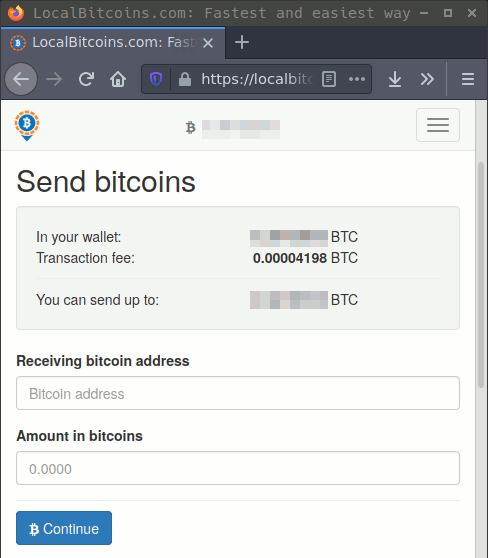
Once you have withdrawn the bitcoin to your wallet, they are now completely yours. Nobody can confiscate them or tell you what you can or can't do with them.
Welcome to Bitcoin.
Some guides (like this bitcoin guide at beastsofpoker.com) recommend you set up an online wallet like Wirex to withdraw your bitcoins to. These online wallets are convenient because they allow you to access your bitcoins from any computer, but be aware they also manage your private keys, so they still have ultimate control over your bitcoins.
Anyway, when you want to send these bitcoins on to somewhere else (e.g. an online poker room), you need to make a transaction, which just involves entering an address and an amount and clicking send.
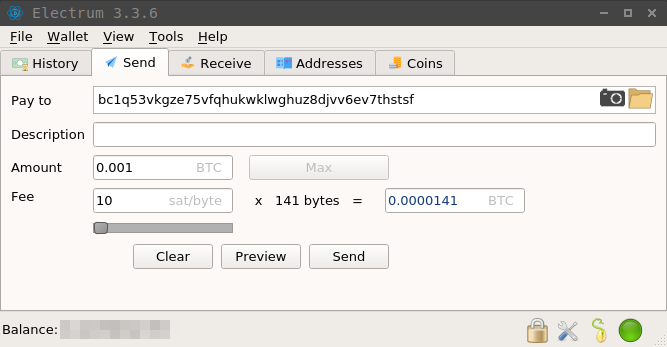
And that’s it.
Transactions get sent around the bitcoin network and are usually "processed" in about 10 minutes. This is because the transaction needs to be written to the blockchain to make it irreversible (which is what “miners” are doing when they are “mining”). This takes energy, but once a transaction is mined (or “confirmed”), it cannot be reversed.
But that’s just the technical stuff.
Bitcoin FAQ
What is a seed?
A seed is used as the source to generate all the private keys and addresses in your wallet. So if your computer crashes, you can regenerate all of your keys and access your bitcoins again.
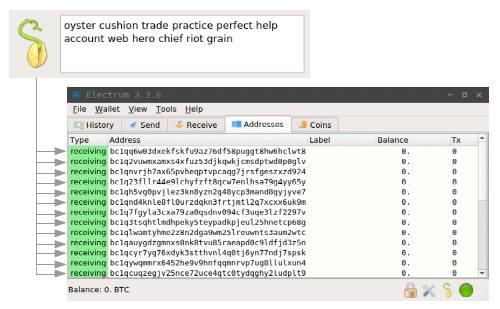
The seed is essentially a very large random number that nobody in the world has generated before (or will generate in the future). This number is then converted in to a 12 to 24 word “mnemonic” to make it easier to store, but it just represents a number at the end of the day.
Now here's the important part: Keep your seed secure and do not show it to anyone.
- If you lose your seed, you lose your ability to recover your bitcoins.
- If someone sees your seed, they can use it to steal your bitcoins.
Do not take a screenshot of your seed, save it to a text file, or store it in the cloud. If your seed is exposed to the Internet, it’s at risk of being found by any malware that might make it in to your computer.
The simple and secure way to store your seed is to write it on paper.
What is an address?
An address is essentially an “account number” that you can give to people so they can send you bitcoins. Your wallet can generate billions of addresses, so you can use a new address every time you want to receive a payment.
To be a little more technical, when you send and receive bitcoins you’re actually using a pair of keys:
- Private Key – This is a randomly generated number.
- Public Key – This is a number calculated from the private key.
An address is essentially a user-friendly version of a public key. So when you give someone your address, you're actually giving them one of your public keys. And when someone “sends” bitcoins to you, they are essentially creating a new box of bitcoins and putting your public key inside a lock on top of it.
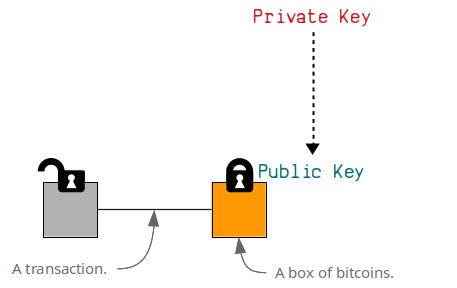
And when you send bitcoins to someone else, you use your private key to unlock the box.
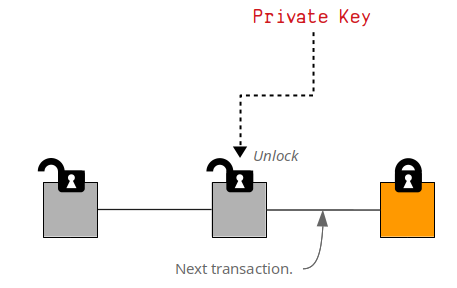
This is getting in to the realms of cryptography, but this kind of technology has been around since the 1970s (see RSA), and bitcoin just uses it to construct a system that works as a digital currency.
Summary: We use private and public key pairs from cryptography to provide ownership over digital data (i.e. bitcoins), and an address is just the convenient version of the public key.
What happens if I type in the wrong address?
Well, there are two different types of mistakes you could make when creating a transaction:
- Making a typo in the address.
- Copying and pasting the wrong address.
All bitcoin addresses have error detection built in, so if you make a small mistake, your wallet should tell you that you’ve entered an invalid address and prevent you from making the transaction. The chances of you making a typo and it not being detected are 1 in 4,294,967,295, so typos aren’t a worry.
However, the most likely mistake is that you copy and paste the wrong address. If this happens, you’ve got a problem. The address will be valid, so the transaction will go through, and once it gets in to the blockchain it cannot be reversed. The only thing you can do is hope that you know the person who owns the address so you can ask them to send it back to you.
So always double-check when copying and pasting an address.
There’s no need to be fearful about making transactions, you just need to be careful.
Tip: I usually just look last 5 characters to check that I’m sending to the right address. Checking each individual character is overkill. The odds of the last 5 characters of an address being the same as another address are 1 in 656,356,768, so pretty unlikely.
What is a confirmation?
A confirmation is when your transaction goes from temporary storage (the “mempool”) in to permanent storage (the “blockchain”) across the computers on the bitcoin network.
In other words, it’s when the transaction is finalized.
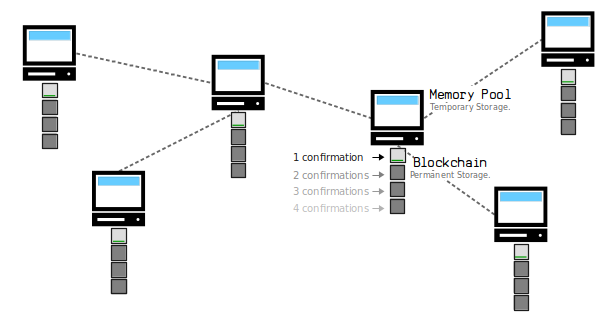
To give an analogy; a transaction in the memory pool is up in the air, and getting a confirmation for it is like burying it in the ground. Extra confirmations pile more dirt on top, and the more dirt you pile on top, the harder it is to remove it from the ground. And in the world of bitcoin, the dirt is processing power.
Some people like to wait for more than one confirmation before they consider a transaction irreversible. In 99.98% of cases one confirmation is enough, but extra confirmations are useful in the rare event of a chain reorganisation, where the transaction goes back in to the memory pool and has to be mined in to the blockchain again.
But anyway, when it comes to how many confirmations you should wait for:
- 1 = Good enough.
- 2 = Best if you want to avoid a chain reorganisation, which happens roughly once every 5,000 blocks.
- 6+ = Only necessary if you suspect someone is going to perform a global-scale attack to try and reverse your transaction.
I'm happy with one confirmation.
What is the blockchain?
The blockchain is basically one big file where all the bitcoins are stored. This file is shared across thousands of computers running the Bitcoin program.

Note: Bitcoins aren’t actually stored in your wallet. Your wallet just holds the keys that you need to lock and unlock the bitcoins in the blockchain.
It’s called the blockchain because new transactions are added to the file in batches called “blocks”, and each of these blocks is built on top of another to create one long “chain”. So blockchain.
New blocks are added to the chain through the process of mining. Mining takes a lot of computing power, and is essentially a network-wide competition where anyone has a chance of mining the next block. This means that no single person or computer is in control of which transactions get added to the blockchain next.
You can see inside the blockchain (e.g. check the status of your transactions) using blockchain explorers:
- https://mempool.space (Most Popular)
- https://bitcoinexplorer.org/ (Open Source)
- https://learnmeabitcoin.com/explorer/ (Technical)
What is a transaction fee?
A transaction fee is used as an incentive for miners to include your transaction in the next block. In other words, it increases its priority.
A block can only hold roughly 1.5MB of data (around 4,000 transactions on average), and blocks are only added to the blockchain every 10 minutes. As a result, there is a bottleneck on the rate that transactions can make it in to the blockchain.
If there are a lot of transactions in the memory pool (more than can fit in a single block), a miner will fill their block with transactions with the highest fees on them first, as they are allowed to collect these fees if they are successful in mining the block.
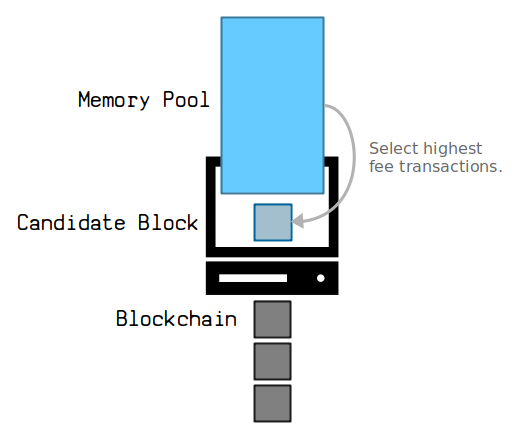
So again, by setting a fee you are setting the priority for getting the transaction in to the blockchain.
Your wallet should give you a rough idea of how the different transaction fee sizes will affect the expected time for your transaction to get mined:

As a general rule of thumb, set the lowest fee on the transaction that you can get away with. But if you want to ensure that the transaction is mined in to the next block, you will need to bump up the fee. Just be careful not to go overboard.
Advanced Tip: If you want to look at exactly which transactions are getting mined based on fee size, check out this awesome live visualization: Johoe's Bitcoin Mempool Statistics
But at the end of the day, if you’re not sure what fee to use, just stick with the default option in your wallet.
How can I secure my bitcoin?
If you want to keep your bitcoin extra secure, use a hardware wallet like a Trezor or Ledger. I like Trezor.
A hardware wallet is basically a mini computer that is specifically designed to manage your private keys and addresses (like your desktop wallet does). However, this is the only thing the hardware wallet does, and it does not have an internet connection, so it is not vulnerable to attacks like your desktop wallet is.
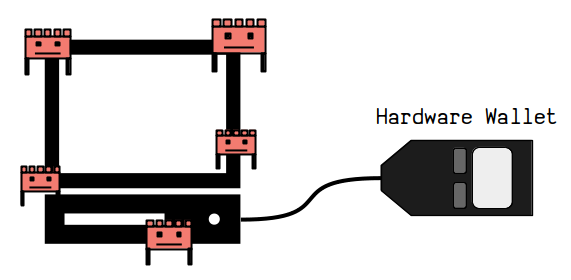
A desktop/mobile wallet (also known as a "hot wallet") is fine for day-to-day usage, but if the amount of bitcoin you hold in there is starting to make you feel uneasy, you need to get a hardware wallet.
It’s like keeping cash inside your home. You’d be comfortable leaving your day-to-day spending in the kitchen drawer, but when it comes to your life savings, you’d rather keep it inside a heavy safe. A hardware wallet is that heavy safe.
Just get a Trezor and put your mind at ease.
And keep out of my kitchen drawer.
Bitcoin Poker FAQ
When did Bitcoin Poker start?
In 2011. Here’s a brief timeline:
- 2008 – Satoshi Nakamoto starts working on a computer program for an electronic payment system. This was likely motivated by the financial crash caused by banks in 2008, and Satoshi’s desire to have an alternative to the traditional banking system.
- 2009 – Bitcoin is released.
- 2011 – Seals With Clubs is launched, the first bitcoin poker site. Bryan Micon is the front man for it, although probably not involved with actual technical development.
- 2014 – Americas Cardroom is the first well-established online poker room to adopt bitcoin as a payment method. You still play in dollars, but you can get money in to and out of the room using bitcoin.
- 2015 – Seals With Clubs stops operations after its servers get raided, but players are able to withdraw their balances. A couple of months later the room is reincarnated by a group of volunteers and is rebranded as SwC Poker.
- 2016 – Ignition Poker (and other major gambling companies) start adopting bitcoin as a payment method too, reinforcing bitcoin’s role as a viable deposit and withdrawal options amongst players.
- 2025 – Everything is ticking along nicely.
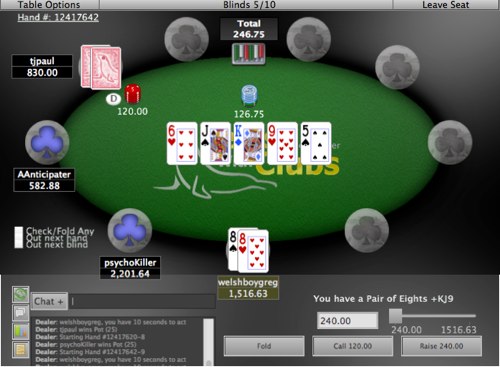
So basically, the first bitcoin poker site came out in 2011 (Seals With Clubs) and still continues to this day (albeit under the new name SwC Poker). In 2014 the more established sportsbooks and poker sites started to join the party by adding bitcoin/cryptocurrency as an option in their cashiers.
In 2020 the landscape is steady. Bitcoin is no longer the “new thing” and is actually becoming a preferred option amongst players due to the freedom it provides, and I believe it will only become more popular as a payment method as time progresses.
Historical Note: It’s worth mentioning that Seals With Clubs came out a mere two years after bitcoin was released. This was back when using bitcoin was a technical minefield, and building a functioning poker room on top of it would have required a high level of determination, skill, and belief. Just wanted to acknowledge their efforts and achievements.
What about other cryptocurrencies?
Save yourself the hassle and stick with Bitcoin.
I know how it goes... you’ve been using bitcoin for a little while and you’re enamored with this new technology. You start to see a whole new world of various other cryptocurrencies open up, and you want to get involved with those too. You sign up to an exchange and start trading for the coolest coins until you have a nice diverse portfolio of cryptocurrencies you know nothing about. But, you’re riding your first wave of financial freedom, and the promise that one of these random coins could explode at some point keeps you going.
You could be right, but you’re on a dangerous path.
Bitcoin is easy to clone, but it’s not easy to create a coin that is technically superior to it. Other cryptocurrencies may look promising, but the vast majority of them are merely copies with a marketing campaign. And marketing campaigns don’t last forever.
I’m not saying that Bitcoin is the only cryptocurrency you should use (nor can I stop you), but it’s the only one I trust completely at this moment in time. It’s volatile enough as it is. If you want my advice, keep the majority of your crypto in bitcoin.
Bitcoin is boring, and that’s a good thing.
How long do deposits and withdrawals take?
Deposits are close to instant, and withdrawals are usually within 24 hours (sometimes in less than 1 hour at the smaller bitcoin-only poker rooms like SwC Poker).
The actual bitcoin transactions themselves are completed on the bitcoin network in about 10 minutes (on average). However, the poker rooms still like to manually check the transaction before adding the funds to your balance or authorizing the withdrawal.
Current average withdrawal times are:
- SwC Poker - Within
1 Hours - Ignition Poker - Within
24 Hours - Americas Cardroom - Within
48 Hours
Last Checked: July 2025.
The amount of time it takes for a bitcoin deposit/withdrawals be authorized varies from room to room. But under 24 hours is the benchmark.
So it’s not an instant-withdrawal utopia just yet, but it’s still good.
What are the risks?
This is the part where I tell you about all the risks so that I can absolve myself from any responsibility after suggesting that bitcoin might be well-worth checking out.
So here we go:
- The price goes up and down. Bitcoin is still a small currency in the grand scheme of things, so it experiences greater price fluctuations than the likes of the dollar, euro, pound, etc. If you hold bitcoin, don’t expect it to stay the same price from one day to the next.
- You are in control of security. If you lose your bitcoins, they’re gone. There is no support helpline or ability to reverse a transaction. The freedom and control that bitcoin gives you comes at a price, and that price is having to look after your own money. It’s a double-edged sword, and it’s not one that everyone will want to wield.
- It’s a computer program. I don’t see any technical flaws that could cause it to become fundamentally broken, but you never know. I have confidence in how it works, but that’s only because I understand the technology. Use your own judgement.
At the end of the day, you’re a poker player, so you’re not new to risk. If anything you’re about as close friends with risk as you can get. Bitcoin is just another part of your everyday risk analysis.
Conclusion
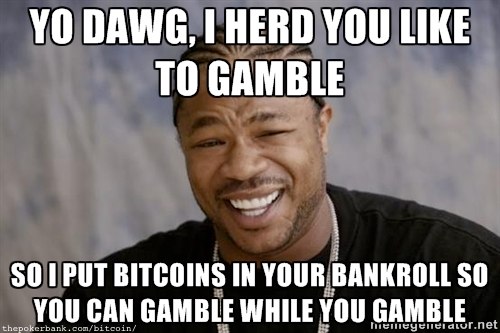
I’m obviously a big fan of playing online poker with bitcoin, and I’m enthusiastic about it’s future. I like how bitcoin gives you the freedom to send money to anywhere in the world, and bitcoin poker sites are an expression of this freedom.
I personally prefer the bitcoin-only poker rooms, as these are on the frontier of modern online poker. Their software is cool and I like the way they run their poker rooms, giving you the privacy you deserve. The traditional poker rooms that use bitcoin as an additional payment method are not as exciting to me, but it’s cool to they do.
My top three bitcoin poker sites are currently:
- SwC Poker
- Ignition Poker (Deposits/Withdrawals)
- Americas Cardroom (Deposits/Withdrawals)
If you’ve not tried using bitcoin before, I think it’s something that’s worth exploring.
Comments
